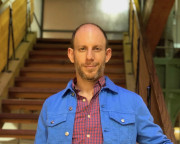New Member Spotlight: Harris Solomon Sheds Light on the COVID-19 Pandemic
“The administration needs to send test kits and masks to every American household…mailing masks and test kits is not rocket science. It will save lives. And compared to the costs of an ongoing pandemic, it will cost pennies on the dollar.” - Harris Solomon & Martha Lincoln, Washington Monthly
For this new member spotlight, SSN is excited to highlight Dr. Harris Solomon and his work to shed light on the many challenges – and solutions – America still faces in combating the COVID-19 pandemic.
For his membership contribution, Solomon published an OpEd in Washington Monthly with fellow SSN member Professor Martha Lincoln about the need to send every American at-home COVID-19 tests. Solomon and Lincoln were inspired to write the piece after a December 11th press conference where Biden’s press secretary Jen Psaki irritatedly shot back at a reporter asking about the lack of free COVID-19 tests for the public by saying: “Should we just send one to every American?”
In the article, Solomon and Lincoln laid out the many reasons why indeed, sending every American free COVID-19 tests, in addition to high quality masks, would be good public health policy amidst the Omicron surge. Though the Biden administration had just announced a plan to make 500 million additional rapid, at-home COVID-19 tests available to the public, the authors argued that more could and should be done. They wrote:
“While Americans will be able to request a free rapid test from a website to be unveiled in the New Year, this will still delay access to a primary tool for preventing transmission—as individuals are likely to request tests when they are already experiencing symptoms. Though it’s admirable to commit federal resources to providing such a large number of free tests, pinning this policy on consumer desire is risky. Instead of building a loophole into our national program for expanded testing, the administration should follow through by mailing tests to all Americans.”
Since the publication of their article, the Biden administration announced plans to purchase an extra 500 million free COVID-19 tests to be distributed to the public. Additionally, along the lines of Solomon’s and Lincoln’s recommendations, the White House released 400 million N95 masks from the Strategic National Stockpile to be made available for free to the public at local pharmacies and health centers.
Following the publication of this contribution, Dr. Solomon quickly turned his attention to another challenge in the ongoing fight against COVID-19: a healthcare system that many feel, “is on fire and the world is silently watching.” Drawing on a collaborative study of the work of ICU care in the US during the pandemic, Solomon penned an OpEd for STAT, a health and medicine focused publication, to show how Omicron is magnifying existing challenges for these workers. In the piece, he argued that healthcare workers, in particular those in the ICUs, have been stretched to their limits. To move forward, he wrote:
“Health care workers in short-staffed ICUs do not need labels of heroism and burnout or free pizza. They need fair wages, policies that sustain safe workplaces, and a public understanding that their work cannot be taken for granted.”
Solomon is currently analyzing the data and working on several publications from this collaborative research study. He is also beginning a new project on the intersections between medicine and law in India, where he has conducted ethnographic research for many years.

Dr. Solomon is the Fred W. Shaffer Associate Professor of Cultural Anthropology and Global Health at Duke University. His research focuses on the social dimensions of medicine and public health, in the US and globally. With research experience in both India and the US, Solomon's writings address topics of epidemics, hospital work, and COVID-19. His most recent work is a book project, entitled Lifelines: The Traffic of Trauma, an ethnographic study of road and railway injuries and of trauma surgery.